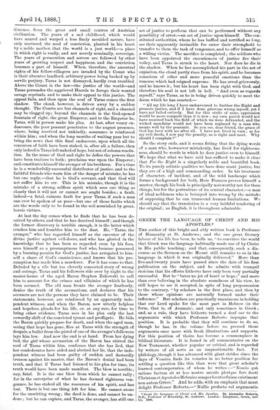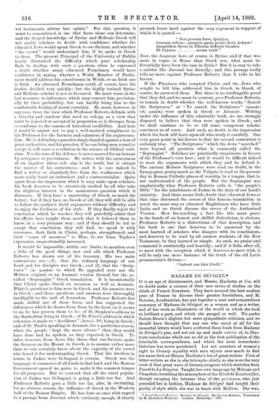GREEK THE LANGUAGE OF CHRIST AND HIS APOSTLES.*
THE author of this bright and ably written book is Professor of Humanity at St. Andrews ; and the one great literary labour of his life has been, he tells us, " to convince the world that Greek was the language habitually made use of by Christ in His public teaching; and that, consequently, such a dis- course as the Sermon on the Mount still remains to us in the language in which it was originally delivered." More than five-and-twenty years have passed since the date of his first publication on the subject, and he admits with tranquil stoicism that his efforts hitherto have only been very partially successful. But he " bates no jot of heart or hope ;" and more than ever believing in the absolute soundness of his view, be still hopes to see it accepted, in spite of long prepossession to the contrary, " by scholars in the first place, and then by those whose opinions are naturally formed under their influence." But scholars are practically unanimous in holding that our Lord spake for the most part in Hebrew (in the form, that is, of Aramaic), and only sometimes in Greek ; and, as a rule, they have hitherto turned a deaf ear to the arguments with which Professor Roberts impugns that position. It is probable that they will continue to do so, though he has, in the volume before us, pressed those arguments once more with fresh illustrations and supports. For this position of theirs has become a commonplace in biblical literature. It is found in all commentaries on the New Testament, whether popular or critical, and is regarded by writers of all sorts as an unquestionable fact. Yet philology, though it has advanced with giant strides since the days of Vossius, finds its votaries in no better position for settling a question like this than were that great scholar's learned contemporaries, of whom he writes :—" Nescio qua. ratione factum sit ut hoc nostro BEIX1110 plerique fere docti Christum et Apostolos Hebraice semper locutos fuisse existiment non autem Greece." And he adds, with an emphasis that must delight Professor Roberts,—" Nullis profecto vel argumentis
• Greek the Language of Christ and His Apostles. By Alexander Roberts, D.D., Professor of Humanity, Bt. Andrews. London : Longmans, Green, and Co. 1338.
vel testimoniis nititnr 'nee opinio." For this question, it must be remembered, is one that facts alone can determine, and the deepest knowledge of Syriac and Hellenic Greek will not enable scholars to decide with confidence whether the educated Jews would speak Greek to our Saviour, and whether " the crowd " would understand him if he. spoke in Greek to them. The present Principal of the University of Dublin neatly illustrated the difficulty which pure scholarship finds in dealing with such a question, when he expressed a doubt whether many educated Frenchmen would have confidence in saying whether a Welsh Member of Parlia- ment would address his constituents in Welsh, or an Irish one in Irish. An educated Frenchman could, of course, have his doubts decided very quickly ; but the highly trained Syriac and Hellenic scholar is not so favoured. He must trust, in the last resource, to inferences which may convert him provision- ally by their probability, but can hardly bring him to the comfortable feeling of moral certainty. He must, however, in any case, treat the view which Professor Roberts defends with a vivacity and candour that need no eulogy, as a view that must be rejected or accepted in proportion as it diverges from or conforms to the canons of historical credibility. And here it would be unjust not to pay a well-merited compliment to the Professor for the fairness and calmness of his argumenta- tion. He is defending a paradox single-handed against a host of great authorities, and his paradox, if he can bring men round to accept it, will cause a revolution in the science of biblical criti- cism. Yet the tone of his defence is never marred for an instant by arrogance or peevishness. He writes with the earnestness of an inquirer whose sole aim is the truth, but is always the master of his earnestness ; and it is rare indeed to find a writer so singularly free from the weaknesses which most easily beset an enthusiast and a controversialist. Quite apart from the impression which it may make upon scholars, his book deserves to be attentively studied by all who take the slightest interest in the momentous question which it discusses. If they have a smattering of Greek, so much the better ; but if they have no Greek at all, they will still be able to follow the author's lucid arguments without difficulty, and to enjoy the liveliness of his style. If they finally reject the conclusion which he reaches, they will gratefully admit that his efforts have taught them much that it behoved them to know, in a very pleasant way ; and if they should be led to accept that conclusion, they will find, we speak it with reverence, their faith in Christ, perhaps, strengthened, and their " sense of nearness" to Him, to use Isaac Taylor's expression, unquestionably increased.
It would be impossible, within our limits, to mention even a tithe of the good things, new and old, which Professor Roberts has drawn out of his treasury. His two main contentions are,—(1), that the ordinary language of our Lord and his disciples was Greek ; and (2), that the "Scrip- tures " (ai yprePsti) to which He appealed were not the Hebrew original, or an Aramaic version thereof, but the so- called " Septuagint " Greek translation. It is incontestable that Christ spoke Greek on occasion, as well as Aramaic. Pilate's questions to hira_were in Greek, and his answers were in Greek ; and these questions and answers were thoroughly intelligible to the mob of Jerusalem. Professor Roberts has made skilful use of these facts, and has supported the inferences which he draws from them by the facts (as it seems to us, he has proven them to be) of St. Stephen's address to the Sanhedrim being in Greek ; of St. Peter's address in which reference is made to " Aceldama" (Acts i., 19), being in Greek ; and of St. Paul's speaking in Aramaic, for a particular reason, when the people " kept the more silence " than they would have done had he spoken, as they expected, in Greek. To infer, however, from facts like these, that our Saviour spake the Sermon on the Mount in Greek, is to assume rather more than we can certainly know about the capacity of the crowd who heard it for understanding Greek. That the dwellers in towns in Judam were bi-lingual, is certain. Greek was the language of commerce of all kinds in that land, and the Roman Government spared no pains to make it the common tongue for all purposes. But to contend that all the rural popula- tion of Judaea was bi-lingual, is going a little too far. And Professor Roberts goes a little too far, also, in overrating, for no obvious reason, the influence of Greek in the Western half of the Roman Empire. He has done so once with regard in a passage from Juvenal. which. curiously enough, if closely
pressed, bears hard against the very argument in support of which it is quoted Non possum ferre, Quirites, Grreeam urbem : quamvis quota portio fucis AchEece ? Jampridem Syrus in Tiberim defluxit Orontes Et iinguam serum vexit."
Now, the language here, of course, is Syriac, and if that was more in vogue at Rome than Greek was, what must in- ferentially have been the case in Syria ? But it is easy to take a satirist like Juvenal too literally ; and this passage really tells no more against Professor Roberts than it tells in his favour.
If the Pharisees who tempted Christ, and the Jews who sought to kill him, addressed him in Greek, in Greek, of course, he answered them. But there is no irrefragable proof that they did, and we must be content, pace Professor Roberts, to remain in doubt whether the well-known words, " Search the Scriptures," or " Ye search the Scriptures " (impure
sais ypeapcis) were spoken in Greek or Aramaic. Writing under the influence of this admirable book, we are strongly disposed to believe that they were spoken in Greek ; and
we shall continue to be so till some competent scholar convinces us of error. And such, no doubt, is the impression which his book will leave upon all who study it carefully. One very great point in his favour is that his second contention is certainly true. " The Scriptures " which the Jews " searched " were beyond all question what is commonly called the " Septuagint." Scholars are practically unanimous in favour of the Professor's view here ; and it would be difficult indeed to meet the arguments with which they and he defend it. The ancient Hebrew Scriptures were read, no doubt, in the Synagogues, pretty much as the Vulgate is read at the present day in Roman Catholic places of worship, in a tongue, that is, not understanded of the people. But the Septuagint was emphatically what Professor Roberts calls it, "the people's Bible " for the inhabitants of Judaea in the days of our Lord's ministry. And there seems little doubt that educated Jews at that time discussed the errors of this famous translation in much the same way as educated Englishmen who have little Latin and no Greek discuss the errors of the Authorised Version. How far-reaching a fact like this must prove in the hands of an honest and skilful dialectician, is obvious. Professor Roberts is a dialectician of that description, and his book is one that deserves to be answered by the most learned of scholars who disagree with its conclusions, and deserves to be read by all earnest students of the New Testament, be they learned or simple. As such, we praise and commend it unstintedly and heartily ; and if it fails, after all, to meet with the reception which it deserves to meet with, it will be only one more instance of the truth of the old Latin grammarian's dictum,- " habent sua fata libelli."



































 Previous page
Previous page